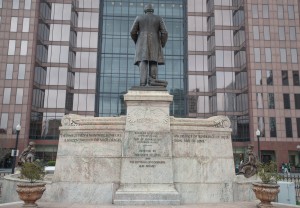
US Supreme Court Justice Stephen Breyer has offered students considering law as a career some excellent advice which I would extend it to undergrads thinking of business courses.
In an interview published in the New York Review of Books for Nov. 7, 2013, Ioanna Kohler asked Justice Breyer:
…[A] student asked you what major you would recommend he select in order to become a lawyer. …[Y]ou suggested that he choose “whatever major you want, as long as it has nothing to do with the law.” You, in fact, studied philosophy at Stanford and Oxford before studying the law at Harvard. How can the humanities or foreign languages be an asset for a jurist?
Justice Breyer responded:
…I’ve always thought that it was not particularly useful to study law as an undergrad. We are only allowed to live one life: it’s the human condition, there’s no escaping it. In my view, only by studying the humanities can we hope to escape this fundamental limitation and understand how other people live. Because literature, history, or philosophy all provide extraordinary windows on the world. Foreign languages, too, are fundamental.
The French language gave me an entrée into another culture. It allowed me to discover different means of expression, a different way of life, different values, a different system of thought. Because when you’re a judge and you spend your whole day in front of a computer screen, it’s important to be able to imagine what other people’s lives might be like, lives that your decisions will affect. People who are not only different from you, but also very different from each other. So, yes, reading is a very good thing for a judge to do. Reading makes a judge capable of projecting himself into the lives of others, lives that have nothing in common with his own, even lives in completely different eras or cultures. And this empathy, this ability to envision the practical consequences on one’s contemporaries of a law or a legal decision, seems to me to a crucial quality in a judge.
Breyer has stated our case – his and mine – more positively (and far more eloquently) than I do.
For me the question came up most often in terms of undergraduate business courses. Students shouldn’t take courses, I’d insist, that shut off options. I’ve observed that ‘pre-professional courses’, like undergraduate finance, lock students into a track they’ll find it hard to exit as their careers evolve.
Wait until law school or business school to pick up courses on the trade.
Also, students lack, in their late teens and early twenties, both the experience and the exposure to history, politics and the like to put undergraduate business and law courses into a meaningful context, much less synthesise them.
So, I’m with Justice Breyer.
The NYRB interview, ‘On Reading Proust’, was originally ‘published in La Revue des Deux Mondes in Paris as part of a special issue entitled “Proust vu d’Amérique.”’ The interview was conducted in French. It’s worth reading in its entirety.
Recent Comments